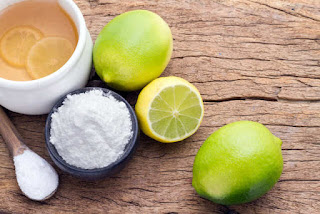Can Baking Soda and Water Really Whiten Your Skin? Let's Talk!
Hey everyone! So, you're curious about using baking soda and water to lighten your skin tone? I get it. We're bombarded with promises of flawless, radiant skin, and it's tempting to try home remedies, especially when they seem so simple and readily available. But before you start mixing up a paste, let's dive into the reality of using baking soda for skin whitening. It's not quite the miracle cure many claim, and it's crucial to understand why.
Understanding the Hype: Why Baking Soda for Skin Whitening?
The idea behind using baking soda for skin whitening centers around its mild abrasive properties. Baking soda, or sodium bicarbonate, is slightly alkaline. Some people believe this alkalinity can help exfoliate the skin, removing dead skin cells that might contribute to a dull complexion. The logic is that by removing this dead layer, you reveal brighter, fresher skin underneath. Sounds good, right? Well, it’s a bit more complicated than that.
The Science (or Lack Thereof):
While baking soda *can* exfoliate, it's crucial to remember that it's a very harsh exfoliant. Your skin has a natural pH balance, and disrupting it with an alkaline substance like baking soda can lead to more problems than solutions. Over-exfoliating can cause irritation, redness, dryness, and even damage the skin's protective barrier, making it more vulnerable to environmental stressors and infections. There's simply no scientific evidence to support the claim that baking soda can actually lighten your skin tone in a significant or lasting way.
What often happens is that the temporary brightness you see after using a baking soda scrub is simply due to the removal of dead skin cells. This is not true skin whitening. Your natural skin tone will return once the skin regenerates.
How to Use Baking Soda (If You Decide to Try It - Proceed with Caution!)
I strongly advise against using baking soda as a skin whitening agent. However, if you're determined to try it despite the risks, proceed with extreme caution. Remember, this is not a proven method and could harm your skin. Always perform a patch test first!
The Patch Test: Your First Line of Defense
Before applying anything to your entire face or body, always do a patch test. Mix a tiny amount of baking soda with water to create a paste. Apply it to a small, inconspicuous area of skin (like the inside of your elbow) and wait for 24 hours. If you experience any redness, burning, itching, or irritation, do not use it on your face or body.
If you still decide to proceed (at your own risk):
Safer and More Effective Alternatives for Brighter Skin
Instead of risking skin damage with baking soda, let's talk about safer and more effective ways to achieve brighter, healthier-looking skin:
The Bottom Line: Proceed with Caution (or Don't at All!)
While the idea of using baking soda for skin whitening might seem appealing due to its simplicity and accessibility, the risks far outweigh the potential benefits. The abrasive nature of baking soda can lead to irritation, dryness, and damage to your skin's protective barrier. There's no scientific evidence to support its use for skin whitening, and the temporary brightness you might see is likely just due to the removal of dead skin cells, not actual lightening of your skin tone.
If you're looking for brighter, more radiant skin, focus on proven methods like gentle exfoliation, sun protection, hydration, a healthy diet, and potentially professional treatments. Always consult a dermatologist for personalized advice and to address any specific skin concerns.
Commonly Asked Questions
Q: Will baking soda lighten my dark spots?
A: No, there's no scientific evidence to suggest that baking soda can lighten dark spots. In fact, it could potentially irritate the skin, making dark spots even more noticeable.
Q: Is baking soda safe for sensitive skin?
A: No, baking soda is generally too harsh for sensitive skin. It can disrupt the skin's natural pH balance and cause irritation, redness, and dryness.
Q: How often can I use a baking soda scrub?
A: Even if you choose to use it, you shouldn't use a baking soda scrub more than once or twice a week, at most. More frequent use will likely lead to irritation and damage your skin barrier.
Q: What are some better alternatives to baking soda for skin brightening?
A: Consider gentle exfoliants with natural ingredients, chemical exfoliants (with a dermatologist's guidance), sun protection, hydration, a healthy diet, and professional treatments like chemical peels or microdermabrasion.
Q: Can I mix baking soda with other ingredients for a better effect?
A: While you might see recipes online combining baking soda with other ingredients, it's best to avoid this. Combining baking soda with other potentially irritating substances can increase the risk of skin damage. Stick to proven, safe skincare methods.







0 comments:
Post a Comment
Note: Only a member of this blog may post a comment.